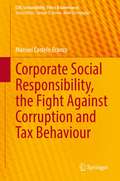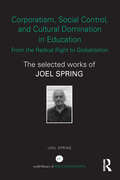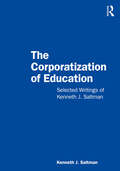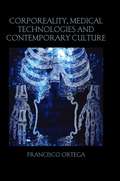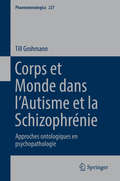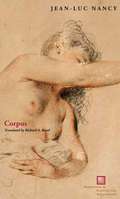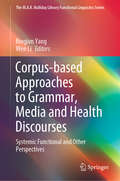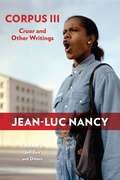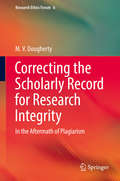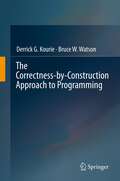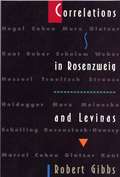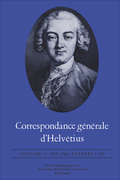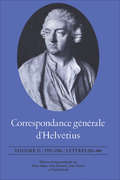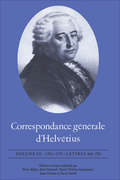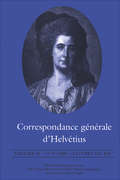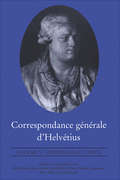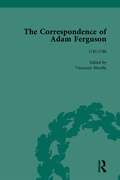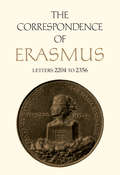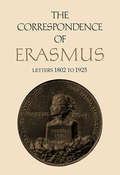- Table View
- List View
Corporate Social Responsibility and Corporate Change: Institutional and Organizational Perspectives (Ethical Economy #57)
by Arnaud SalesThis wide-ranging book examines the new dynamics of corporate social responsibility (CSR) and the impact they have had on the transformation of business corporations. Written by an international group of distinguished experts in management and organization studies, economics and sociology, the book leads one to theoretically and practically rethink CSR, a movement that has developed into a strong and rich institutional domain since the mid 1990s. Through 14 chapters, the book shows the complexity, diversity and progression of the institutional work performed by a large number of individual and organizational actors in specialized networks to develop this strategic field. Central to this book are: the core issues associated with the field of CSR; recent advances in the development, dissemination and implementation of public and private standards of social responsibility; the pressing challenges of developing sustainable strategies of value creation in the face of global warming and underdevelopment; and finally, examples of how CSR has been implemented and institutionalized within business organizations with special attention to the role played by a variety of social actors in organizational change. Conceived as a movement, corporate social responsibility spearheads a transformation project challenging traditional and outmoded forms of corporate governance that frequently pose troublesome ethical issues. From this standpoint, Corporate Social Responsibility and Corporate Change will serve as a reference point for academics, researchers, managers and practitioners.
Corporate Social Responsibility, the Fight Against Corruption and Tax Behaviour (CSR, Sustainability, Ethics & Governance)
by Manuel Castelo BrancoThis book introduces in an accessible way how CSR and its reporting are being used to address problems of corruption and tax evasion or tax avoidance. It discusses the efforts, both of organizations and governments to integrate these issues into CSR practices and the developments that have occurred at the levels of national and international legislation. The book analyses governments efforts to compel or try to induce companies to have practices more in line with what is expected of them in terms of combating corruption and paying their fair share. The book is suitable for students of CSR and Business Ethics, practitioners and researchers on CSR and corporate issues.
Corporatism, Social Control, and Cultural Domination in Education: The Selected Works of Joel Spring
by Joel SpringStarting with the 1972 publication of his seminal work, Education and the Rise of the Corporate State, Joel Spring has been documenting and analyzing the politics of knowledge and education. Throughout his work he has explored the attempts to use education to advance the economic and political interests of dominant groups. The general term he uses for the relationship between schools and power is "ideological management." His scholarly work first looked at the influence on American schooling of business and economic doctrines embodied in human capital theories and consumerism. The next step in his exploration of the politics of knowledge was to examine these issues in the context of globalization, leading to a proposed educational rights amendment to national constitutions and a new paradigm for education, both of which might ensure that schools are protected from ideological management by economic and political elites. Spring’s indigenous background has strongly shaped his interest in the political and economic goals of schooling, particularly the attempts of those in power to use schools to destroy indigenous languages and cultures. In this collection, Spring brings together 10 of his key writings, providing an overview not just of his own career but the larger contexts in which it is situated. In the Introduction he reviews the evolution and scope of his work and his earlier arguments and reflects on its central themes, which are reflected in the writings selected for this volume. In the World Library of Educationalists, international scholars themselves compile career-long collections of what they judge to be their finest pieces – extracts from books, key articles, salient research findings, major theoretical and/practical contributions – so the world can read them in a single manageable volume. Readers will be able to follow the themes and strands of their work and see their contribution to the development of a field, as well as the development of the field itself. Contributors to the series include: Michael Apple, James A. Banks, Stephen J. Ball, Elliot Eisner, Howard Gardner, John Gilbert, Ivor F. Goodson, Peter Jarvis.
The Corporatization of Education: Selected Writings of Kenneth J. Saltman
by Kenneth J. SaltmanKenneth J. Saltman is a defining voice within Education, and for 25 years he has worked to uncover the ways in which public education has been impacted by corporatization and neoliberalism, and to demonstrate what educators and citizens can do to reclaim the democratic purpose of schooling. His work is unique in the way that it bridges a number of traditions, theoretical perspectives, and ranges in scope across the discipline, while at the same time translating crucial concepts in an accessible writing style.In this timely collection, Saltman introduces 11 of his most influential writings across his career with new contextual information for each piece. The volume is framed by a new introduction and conclusion by the author, which re-examine the scope of his work, discuss the larger development of the field over time, and considers what is still to be done.This important work will be crucial to researchers and graduate students in Education courses, particularly within Educational Foundations, Sociology of Education, and Education Policy Studies. The book’s interdisciplinary nature means that it will also be highly beneficial for those studying or researching within Sociology, Communications, and Politics.
Corporatizing Rural Education: Neoliberal Globalization and Reaction in the United States (New Frontiers in Education, Culture, and Politics)
by Jason A. CervoneThis book presents a critical analysis of the anti-democratic and pro-authoritarian ideologies that exist in rural communities in the United States. The author book also explores and recontextualizes existing research in rural education within this anti-democratic framework, as well as theorizing the consequences of this ideology as it takes place in the rural United States, specifically in regards to the physical and ideological shaping of rural communities to meet the needs of capitalist accumulation. Finally, it discusses the ways rural youth can reclaim the public sphere within their communities through critical education.
Corporeality, Medical Technologies and Contemporary Culture: Corporeality, Medical Technologies And Contemporary Culture (Birkbeck Law Press)
by Francisco OrtegaThis book examines the confusions and contradictions that manifest in prevalent attitudes towards the body, as well as in related bodily practices. The body is simultaneously our reference for the certainties of nature and the locus of a desire for transformation and reinvention. The body is at the same time worshipped and despised; an object of desire and of design. Francisco Ortega analyses how the body has become both a screen for the projection of our ideas and imaginings about ourselves and conversely an object of suspicion, anxiety, and discomfort. Addressing practices of corporeal ascesis (such as bodybuilding and dietetics), medical technologies, and radical anatomical modifications, Ortega documents the ambiguous legacy of a western theoretical tradition that has always despised the body. Utilising a theoretical framework that is mainly informed by the phenomenology of the body, feminist theory, disability studies and the thought of Michel Foucault, Corporeality, Medical Technologies and Contemporary Culture address several ethical and psychological issues associated with the experience and perception of the body in our cultural landscape. Drawing on these diverse areas of philosophical and analytical work, this book will interest those researching Law, Medicine, and Sociology.
Corps et Monde dans l’Autisme et la Schizophrénie: Approches ontologiques en psychopathologie (Phaenomenologica #227)
by Till GrohmannLe livre offre une investigation phénoménologique des traits caractéristiques des troubles du spectre de l'autisme et de la schizophrénie. Son matériel de base sont des écrits autobiographiques ainsi que des descriptions de patients en première personne. L’objectif principal de cette investigation est double: premièrement, de systématiquement élaborer la corrélation fondamentale entre le corps et le monde; deuxièmement, de comprendre autisme et schizophrénie comme des transformations typiques de cette corrélation. L’auteur interroge schizophrénie et autisme comme des transformations comparables, mais néanmoins fondamentalement distinctes, de la structure ambivalente du corps propre. Il combine une lecture de philosophie phénoménologique avec des approches provenant de la psychiatrie et de la psychopathologie. L’analyse phénoménologique de la corporéité amène l’auteur à analyser une double structure expérientielle, faite de vécus subjectifs et objectifs du corps. En référence à ce paradigme, autisme et schizophrénie apparaissent comme des possibles destins de la structure ambivalente du corps. Un rôle majeur est ici attribué à la spatialisation, c’est-à-dire aux différents modes de vivre et de représenter l’espace.
Corpus: Writings On Sexuality (Perspectives in Continental Philosophy)
by Jean-Luc NancyHow have we thought “the body”? How can we think it anew? The body of mortal creatures, the body politic, the body of letters and of laws, the “mystical body of Christ”—all these (and others) are incorporated in the word Corpus, the title and topic of Jean-Luc Nancy’s masterwork.Corpus is a work of literary force at once phenomenological, sociological, theological, and philosophical in its multiple orientations and approaches. In thirty-six brief sections, Nancy offers us at once an encyclopedia and a polemical program—reviewing classical takes on the “corpus” from Plato, Aristotle, and Saint Paul to Descartes, Hegel, Husserl, and Freud, while demonstrating that the mutations (technological, biological, and political) of our own culture have given rise to the need for a new understanding of the body. He not only tells the story of this cultural change but also explores the promise and responsibilities that such a new understanding entails.The long-awaited English translation is a bold, bravura rendering. To the title essay are added five closely related recent pieces—including a commentary by Antonia Birnbaum—dedicated in large part to the legacy of the “mind-body problem” formulated by Descartes and the challenge it poses to rethinking the ancient problems of the corpus. The last and most poignant of these essays is “The Intruder,” Nancy’s philosophical meditation on his heart transplant. The book also serves as the opening move in Nancy’s larger project called “The deconstruction of Christianity.”
Corpus-based Approaches to Grammar, Media and Health Discourses: Systemic Functional and Other Perspectives (The M.A.K. Halliday Library Functional Linguistics Series)
by Bingjun Yang Wen LiThis edited volume gathers corpus-based studies on topics including English grammar and discourses on media and health, mainly from a systemic functional linguistics (SFL) perspective, in order to reveal the potential of SFL, which has been emphasized by Halliday. Various other perspectives, such as philosophy, statistics, genre studies, etc. are also included to promote SFL’s potential interaction with other theories. Though they employ a diverse range of theoretical perspectives, all the chapters focus on exploring language in use with the corpus method. The studies collected here are all original, unpublished research articles that address significant questions, deepen readers’ understanding of SFL, and promote its potential interaction with other theories. In addition, they demonstrate the great potential that SFL holds for solving language-related questions in a variety of discourses.
Corpus III: Cruor and Other Writings
by Jean-Luc NancyA beautiful, profound series of reflections on the body by one of the most prominent and consequential philosophers of continental EuropeThis landmark volume brings into English Jean-Luc Nancy’s last completed work and concludes his remarkable philosophical reflections on the body, a project he began almost thirty years ago. Taking the body as an intersection of pulsing life and destructive cruelty on a global scale, Nancy’s account becomes more vivid, more physical, than ever, even as it ventures into language that is as lyrical as it is profound. This vividness is manifest in blood: as it flows, in all its pulsing and forceful circulation, and as it spills, in the cruelty of existences confronted daily by countless destructions. This can be described as sanguis and cruor, the two Latin words for blood’s intermingled but distinct aspects. This distinction allows Nancy to highlight an almost mystical sense of the body (yet one that remains soberly on this side of its manifest insistence), alongside the cruelty that pervades our world—a world whose very existence is threatened by its reduction to mere objects.The exceptional writings brought together in Corpus III comprise a masterful work of philosophy that marries rigorous erudition—on Freud, Nietzsche, and others—with rich poetic language and an actual poem. Nancy’s thought opens the body onto its own unaccountable origins, its plural singularities, its enmeshed instantiations, and its excessive irreducibles, which are also the elusive excesses of language. Whereas in earlier texts Nancy has referred to this excess as poetry, here he performs it in the form of a poem, in the extraordinary hymn entitled Stoma. While the publication of a poem by Nancy is a notable event, equally noteworthy is a remarkable essay entitled “Scandalous Death,” in which Nancy meditated on a subject that was to come to him too soon after. Above all, the book is crucial for bringing into English Cruor, the very last book Nancy completed before his death, an evocative meditation offered by a great thinker on the complex conditions of his own—and our—singular survival.
Correcting the Scholarly Record for Research Integrity: In the Aftermath of Plagiarism (Research Ethics Forum #6)
by M. V. DoughertyThis volume is the first book-length study on post-publication responses to academic plagiarism in humanities disciplines. It demonstrates that the correction of the scholarly literature for plagiarism is not a task for editors and publishers alone; each member of the research community has an indispensable role in maintaining the integrity of the published literature in the aftermath of plagiarism. If untreated, academic plagiarism damages the integrity of the scholarly record, corrupts the surrounding academic enterprise, and creates inefficiencies across all levels of knowledge production. By providing case studies from the field of philosophy and related disciplines, the volume exhibits that current post-publication responses to academic plagiarism are insufficient. It catalogues how humanities disciplines fall short in comparison with the natural and biomedical sciences for ensuring the integrity of the body of published research. This volume provides clarity about how to conceptualize the scholarly record, surveys the traditional methods for correcting it, and argues for new interventions to improve the reliability of the body of published research. The book is valuable not only to those in the field of philosophy and other humanities disciplines, but also to those interested in research ethics, meta-science, and the sociology of research.
The Correctness-by-Construction Approach to Programming
by Bruce W. Watson Derrick G. KourieThe focus of this book is on bridging the gap between two extreme methods for developing software. On the one hand, there are texts and approaches that are so formal that they scare off all but the most dedicated theoretical computer scientists. On the other, there are some who believe that any measure of formality is a waste of time, resulting in software that is developed by following gut feelings and intuitions. Kourie and Watson advocate an approach known as "correctness-by-construction," a technique to derive algorithms that relies on formal theory, but that requires such theory to be deployed in a very systematic and pragmatic way. First they provide the key theoretical background (like first-order predicate logic or refinement laws) that is needed to understand and apply the method. They then detail a series of graded examples ranging from binary search to lattice cover graph construction and finite automata minimization in order to show how it can be applied to increasingly complex algorithmic problems. The principal purpose of this book is to change the way software developers approach their task at programming-in-the-small level, with a view to improving code quality. Thus it coheres with both the IEEE's Guide to the Software Engineering Body of Knowledge (SWEBOK) recommendations, which identifies themes covered in this book as part of the software engineer's arsenal of tools and methods, and with the goals of the Software Engineering Method and Theory (SEMAT) initiative, which aims to "refound software engineering based on a solid theory."
Correlations in Rosenzweig and Levinas
by Robert GibbsRobert Gibbs radically revises standard interpretations of the two key figures of modern Jewish philosophy--Franz Rosenzweig, author of the monumental Star of Redemption, and Emmanuel Levinas, a major voice in contemporary intellectual life, who has inspired such thinkers as Derrida, Lyotard, Irigaray, and Blanchot. Rosenzweig and Levinas thought in relation to different philosophical schools and wrote in disparate styles. Their personal relations to Judaism and Christianity were markedly dissimilar. To Gibbs, however, the two thinkers possess basic affinities with each other. The book offers important insights into how philosophy is continually being altered by its encounter with other traditions.
Correspondance générale d'Helvétius, Volume I: 1737-1756 / Lettres 1-249
by Alan Dainard Claude Adrien Helvétius David Smith Jean Orsoni Peter AllanThis volume is the first of three in a complete critical edition of the letters of Claude-Adrien Helvétius (1715-71) and his wife, née Anne Catherine de Liginville (1722-1800). Though rank and wealth, Helvétius was acquainted with the leading political and social figures of his time, and, through family, with court and government which he occasionally served in a diplomatic capacity. Philosopher and author of the explosive De l'esprit, Helvétius corresponded with the great and the influential throughout Europe. His letters, and those of Mme Helvétius, provide insights into, and new information about, their lives and the political, social, and intellectual history of the eighteenth century. Volume I contains almost 250 letters written by or to Helvétius or his wife. Of these, the largest collections are those from Helvétius to Mme Helvétius, made available by his descendants, and letters from the future Mmem Helvétius to her aunt, Mme de Graffigny, which are at Yale University. Letters to or from third parties are also included. Much of this correspondence has never before been published. Correspondance générale d'Helvétius is fascinating to read; it is indispensable for future study of Helvétius' life and work and of Mme Helvétius' influence on her husband his his circle. This volume has a preface by Comte Charles-Antoine d'Andlau, a descendant of Helvétius, and an introduction by the editors setting out their editorial and critical principles and system of annotation. (University of Toronto Romance Series 41)
Correspondance générale d'Helvétius, Volume II: 1757-1760 / Lettres 250-464
by Allan Dainard Claude Adrien Helvétius David Smith Jean Orsoni Peter AllanThis second volume of the Correspondance générale d'Helvétius covers the period of the publication and reception of Helvétius' controversial first work, De l'Esprit (1758). It begins with a letter of January 1757, in which Helvétius recounts the attempt by Damiens on the life of Louis XV, and ends in December 1760 when the author, having been attacked on the stage of the Théatre-Francais but eulogized in foreign journals, is contemplating voluntary exile. In the meantime De l'Esprit provoked an uprecedented outcry from the court and from the religious and civil authorities. Denigrated as the epitome of all dangerous philosophic trends of the age, condemned as atheistic, materialistic, sacriligious, immoral, and subversive, it enjoyed an immense succes de scandale. Rather than examining the puzzles and paradoxes which surround the affaire de l'Esprit, this volume presents the documents upon which solutions may be based. Helvétius' own letters, often written hastily, under stress, and in fear they might be opened by the Cabinet noir, are less revealing than the letters between other protagonists in the affaire: the Cardinal de Bernis and the Duke de Choiseul, Jean-Omer Joly de Fleury, Malesherbes, Saint-Florentin, Tercier, and Louis xv himself. It is these letters, together with the appendixes containing edicts, retractions, an condemnations that shed new light not only on the development of the affaire but also on the complex workings of the ancien regime
Correspondance générale d'Helvétius, Volume III: 1761-1774 / Lettres 465-720
by Alan Dainard Claude Adrien Helvétius David Smith Jean Orsoni Marie-Thérèse Inguenaud Peter AllanThe first two volumes of the Correspondance générale d'Helvétius inspired international acclaim. Now the third volume offers us further insight into a variety of aspects of life in eighteenth-century France.Claude-Adrian Helvétius (1715-71) was a wealthy and high-ranking member of French society. He was acquainted with the leading political and social figures of his time and, through family, with the court and government which he occasionally served in a diplomatic capacity. Philosopher, encyclopedist, and author of the explosive De l'Esprit, he and his wife, Anne Catherine de Ligneville, corresponded with the great and influential throughout Europe.The letters in this volume were written between 1761 and 1774, a period in which Helvétius enjoyed the fruits of his fame, travelled to England (1764) and Prussia (1765), and produced two books, Le Bonheur and De l'homme, which were published after his death.
Correspondance générale d'Helvétius, Volume IV: 1774-1800 / Lettres 721-855
by Claude Adrien Helvétius David Smith J. A. Dainard Jean Orsoni Marie-Thérèse Inguenaud Peter AllanThis is the fourth of five volumes of the letters of the French philosopher Claude Adrien Helvétius (1715-1771), author of the controversial De l'Esprit (1758). Featuring the correspondence of Mme Helvétius, née Anne Catherine de Ligniville (1722-1800), in the years following her husband's death, this volume also includes letters by and to Helvétius discovered since the publication of the first three volumes. Mme Helvétius enjoyed an active widowhood, welcoming to her salon in Auteuil a group of intellectuals who came to be known as the Idéologues. A close friend of Benjamin Franklin, she was involved in political events before and during the French Revolution, as well as in Napoleon's coup d'état. In the last letter of the series her grandson describes her burial in her garden, which took place without religious or revolutionary ceremony in the presence of all her favourite pets. Most of the newly discovered letters are addressed to Helvétius by figures as important as d'Alembert, Boulanger, Chastellux, Saint-Lambert, Servan, Thieriot, and Trublet. Some of these complete an existing exchange, others provide dates for letters already published. The fifth and final volume will be devoted primarily to a comprehensive index. It will also include a chronological list of all the letters, corrections and modifications, and other useful material.
Correspondance générale d'Helvétius, Volume V: Appendices et Index
by Alan Dainard Claude Adrien Helvétius David Smith Jean Orsoni Jonas Steffen Marie-Thérèse Inguenaud Peter AllanThis fifth and final volume completes the critical edition of the letters of French philosopher Claude Adrien Helvétius (1715-1771), author of the controversial De l'Esprit (1758), and of his wife, née Anne Catherine de Ligniville (1722-1800), who ran her own salon in Auteuil after her husband's death. The essential component in this last volume is the detailed index – an indispensable instrument for researchers who wish to make full use of the correspondence. The volume also includes four new letters discovered since the appearance of the first four volumes, errata, additions and modifications to the critical apparatus, the text of letters excluded from the edition proper, genealogies of the families of Helvétius and his wife, and a chronological list of all letters mentioned in the edition. The previous volumes of this edition have enjoyed international acclaim. "All students of the French Enlightenment will be deeply indebted to D.W. Smith and his team for this superbly conceived and organized collaborative achievement. When complete the Toronto Helvétius will rank among the truly outstanding examples of twentieth-century editorial and bibliographical scholarship." (David Williams, French Studies)
Correspondence: 1923 - 1966
by Theodor W. Adorno Siegfried KracauerTheodor W. Adorno and Siegfried Kracauer were two of the most influential philosophers and cultural critics of the 20th century. While Adorno became the leading intellectual figure of the Frankfurt School, Kracauer’s writings on film, photography, literature and the lifestyle of the middle classes opened up a new and distinctive approach to the study of culture and everyday life in modern societies.This volume brings together for the first time the long-running correspondence between these two major figures of German intellectual culture. As left-wing German Jews who were forced into exile with the rise of Nazism, Adorno and Kracauer shared much in common, but their worldviews were in many ways markedly different. These differences become clear in a correspondence that ranges over a great diversity of topics, from the nature of criticism and the meaning of utopia to the work of their contemporaries, including Bloch, Brecht and Benjamin. Where Kracauer embraced the study of new mass media, above all film, Adorno was much more sceptical. This is borne out in his sharp criticism of Kracauer’s study of the composer Offenbach, which Adorno derided as musically illiterate, as well as his later criticism of Kracauer’s Theory of Film. Exposing the very different ways that both men were grappling intellectually with the massive transformations of the 20th century, these letters shed fresh light on the principles shaping their work at the same time as they reveal something of the intellectual brilliance and human frailties of these two towering figures of 20th century thought. This unique volume will be of great value to anyone interested in critical theory and in 20th century intellectual and cultural history.
Correspondence, 1939 - 1969: 1923 - 1966
by Theodor W. Adorno Gershom ScholemAt first glance, Theodor W. Adorno’s critical social theory and Gershom Scholem’s scholarship of Jewish mysticism could not seem farther removed from one another. To begin with, they also harbored a mutual hostility. But their first conversations in 1938 New York were the impetus for a profound intellectual friendship that lasted thirty years and produced more than 220 letters. These letters discuss the broadest range of topics in philosophy, religion, history, politics, literature, and the arts – as well as the life and the work of Adorno and Scholem’s mutual friend Walter Benjamin. Unfolding with the dramatic tension of a historic novel, the correspondence tells the story of these two intellectuals who faced tragedy, destruction, and loss, but also participated in the efforts to reestablish a just and dignified society after World War II. Scholem immigrated to Palestine before the war and developed his pioneering scholarship of Jewish mysticism before and during the problematic establishment of a Jewish state. Adorno escaped Germany to England, and then to America, returning to Germany in 1949 to participate in the efforts to rebuild and democratize German society. Despite the differences in the lifepaths and worldviews of Adorno and Scholem, their letters are evidence of mutual concern for intellectual truth and hope for a more just society in the wake of historical disaster. The letters reveal for the first time the close philosophical proximity between Adorno’s critical theory and Scholem’s scholarship of mysticism and messianism. Their correspondence touches on questions of reason and myth, progress and regression, heresy and authority, and the social dimensions of redemption. Above all, their dialogue sheds light on the power of critical, materialistic analysis of history to bring about social change and prevent repetition of the disasters of the past.
The Correspondence of Adam Ferguson Vol 1
by Vincenzo Merolle Jane B FaggThis Pickering edition of Adam Ferguson's correspondence contains over 400 letters, most of which have never before been published. The correspondence includes letters between Ferguson and Adam Smith, David Hume and Alexander Carlyle and many other central figures of the Scottish Enlightenment.
The Correspondence of Adam Ferguson Vol 2
by Vincenzo Merolle Jane B FaggThis Pickering edition of Adam Ferguson's correspondence contains over 400 letters, most of which have never before been published. The correspondence includes letters between Ferguson and Adam Smith, David Hume and Alexander Carlyle and many other central figures of the Scottish Enlightenment.
Correspondence of Benedict de Spinoza
by Benedict De SpinozaBenedict de Spinoza was one of the great rationalists of 17th century philosophy, he helped lay the groundwork for the 18th century Enlightenment and modern biblical criticism. His correspondences help shed light on his ethical opinions and positions. Required reading for those who wish a deeper understanding of the writings of Benedict de Spinoza.
The Correspondence of Erasmus
by Alexander Dalzell James M. Estes Desiderius ErasmusThe letters in this volume reflect Erasmus' anxiety about the endemic warfare in Western Europe, the advance of the Ottoman Turks into Europe, and the increasing threat of armed conflict between Catholics and Protestants in Germany. Unable and unwilling to attend the Diet of Augsburg (June-November 1530), summoned by Emperor Charles V in the attempt to mediate a religious settlement, Erasmus corresponded with those in attendance, urging them (in vain) to preserve peace at all costs.The letters also shed light on Erasmus' controversies with Catholic critics (Luis de Carvajal and Frans Titelmans) who accused him of Lutheran sympathies, and former friends among the Protestant reformers (Gerard Geldenhouwer and others in Strasbourg), who embarrassed him by citing him in support of their views. Because of a mysterious and debilitating illness (identified in an appendix to the volume) the twelve months covered were less productive of scholarship than was usual for Erasmus, but it did see the publication of the five-volume Froben edition of St. John Chrysostom in Latin.
The Correspondence of Erasmus: Letters 1802-1925 (Collected Works of Erasmus #13)
by Desiderius Erasmus Charles FantazziThe letters in this volume cover Erasmus' correspondence from March to December 1527. These 129 letters centre primarily on Erasmus' continuing struggle with his Catholic critics, especially those in Spain and France, and on Erasmus' growing criticism of the Protestant reform movement. The letters show Erasmus' attempts to justify his position and to win favour with rulers, other prestigious men, and powerful institutions, all influential in both secular and religious spheres. Although the Inquisition in Spain investigated his orthodoxy and did not bring charges against him, the Paris Faculty of Theology formally condemned 112 propositions drawn from Erasmus' works in December 1527. The letters in this volume, written by and to Erasmus in this critical time, represent a unique view of a Europe torn by war and breaking apart into religious confessionalism and regionally organized churches. Throughout all this controversy, Erasmus repeatedly protested that the sole aim of his life's work was to promote the study of humanities for the profit of both knowledge and religion. Volume 13 of the Collected Works of Erasmus series.

